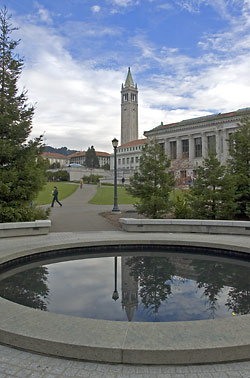UC Berkeley Web Feature
Seizing opportunity in a globalized world
The world is round in Berkeley
This article was first published as a commentary in the Feb. 22, 2006, edition of the San Francisco Chronicle.
 Photo by Bonnie Azab Powell/UC Berkeley |
Last summer, Thomas L. Friedman captured the nation's attention with his best-seller "The World Is Flat." He warned that America was slipping further behind China and India in producing scientists and engineers, at the peril of the innovation and economic productivity of our nation.
A more scholarly version of his message was produced in a 500-page study by the National Academy of Sciences. The Bush administration listened, and the president's State of the Union address last month proposed an American Competitiveness Initiative to lead the world in opportunity and innovation through investment in basic science education and research. The president's initiative also proposed training 70,000 new math and science teachers.
We applaud these initiatives but, concurring with the Chronicle editorial of Feb. 6 ("How to keep U.S. competitive"), we are concerned that this vision, which rolls far into the future and calls for $50 billion over 10 years, be supported by the necessary funding to realize it.
California, and particularly UC Berkeley, have important roles to play in an agenda to revitalize basic science education and research. UC Berkeley, along with other world-leading universities in the Bay Area, have in good part driven U.S. global competitiveness in the biotechnology industry through their basic research.
First, it is a matter of sheer numbers. Friedman's observations that China and India will overtake us technically are built on a New York/New England perspective. The academic establishment in the Northeast is dominated by elite private universities that in recent times have produced far too few graduates pursuing hard-core technical professions. The situation is quite different here in California, where we have what is broadly recognized as the world's best public-university system. UC Berkeley is recognized as a world-leading university that competes with the elite private universities in terms of sheer brainpower. As a public institution, we educate 23,000 undergraduate students, more than 40 percent of whom are in science and engineering.
Perhaps of equal significance, our students have the same fervor to succeed as Friedman witnessed in China and India. Our undergraduate population is much more the functional equivalent of the phenomenon that Friedman has observed in these emerging competitors. Twenty-eight percent of our undergraduates are the first in their family to go to college and approximately one-third are eligible for Pell Grants awarded to students from families with incomes of less than $35,000 a year. In fact, at UC Berkeley alone, we serve more of these economically disadvantaged students than all of the Ivy League universities combined.
Our students value education and approach it with a passion, an almost patriotic fervor to succeed. Admission as an undergraduate to science and engineering at Berkeley, or any one of the UC campuses, is a goal eagerly sought by countless California high-schoolers, including those from economically disadvantaged backgrounds. Moreover, California has a large and vibrant population of women and underrepresented minorities who are not participating fully in science and engineering. Accessing this population is one of the significant challenges of the UC system. Indeed, tapping into this large unrealized talent pool will be an important part of California's edge in the economic battle that Friedman has identified.
To maintain our leading edge, public universities must remain accessible to all those Americans for whom higher education is the door to the American dream of a better life. This is particularly true for underrepresented minorities. In order to guarantee continuing accessibility, we at UC Berkeley have proposed to our legislators in Sacramento a novel program in which the state of California would match endowed donations for financial support for the neediest of our students.
We must also ensure that the children of the poorest citizens of California will attend high schools that aspire to educate the leaders of our state and our nation. Through programs such as UC's California Teach Initiative and UC Berkeley's California Preparatory College Academy, our charter school in Oakland, we are preparing these students for the opportunity to improve their own lives in a changing economy, as well as training them to transform the world. The 70,000 new math and science teachers proposed by President Bush's initiative will make these programs even more attractive to prospective teachers.
Public universities serve as incubators of the next generation of innovators, who will ensure that California leads the United States in retaining its global leadership in competitiveness, the kind of innovation that spawned the Internet and biotech revolutions. Indeed, it is no coincidence that America's new competitors are building mirror images of our public universities to fuel their continued ascendancy.
The Chronicle's Feb. 6 editorial accurately characterized President Bush's American Competitiveness Initiative as a "chance to push both the nation and the boundaries of science forward." California's universities have established a long tradition of playing a leadership role in inspiring and producing innovation and economic growth. We urge all Californians to meet and engage our students and faculty and to witness their fervor and readiness to transform the world. Seeing innovation where it begins will provide a renewed confidence in our nation's continued global leadership and competitiveness.

